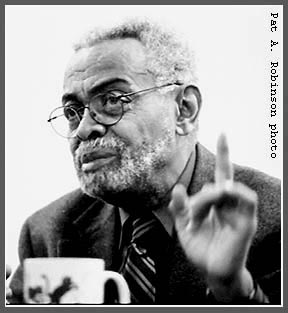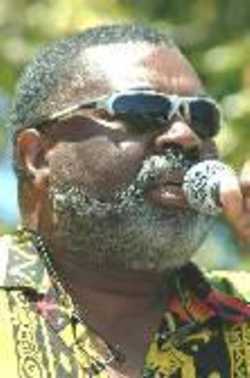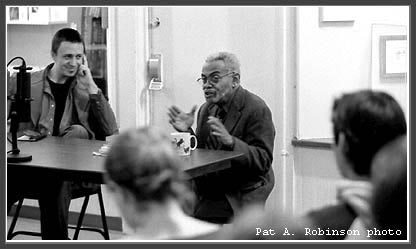
NOVEMBER 2007

Amiri Baraka and Marvin X Rock UC Berkeley Poetry Reading Amiri Baraka was his usual feisty and musical self at Wheeler Hall tonight on the campus of UC Berkeley. He added his own drum beats by pounding on the podium to a packed crowd of mostly white students as he delivered his revolutionary poems in his inimitable style. We were told the Wheeler audience is not used to such disquieting poetics, but they were in for an even greater shock when he handed the mike to his comrade in the Black Arts Movement, the Bay Area's Marvin X, one of the co-founders of BAM and a former UC lecturer in Black Studies. The UC Berkeley Bancroft Library recently acquired his archives.
 Marvin stepped to the podium and
recited in his well known booming voice that rocked the
auditorium and sent shock waves through the students. In
short, they came alive and attentive to his every word,
enunciated clearly as his mother taught him, "Boy,
you are not going far in life if you don't stop mumbling
and speak up so people can understand what you
saying." He read three poems: This, What If
and Baghdad by the Bay: The Surge is Working. Even though
shocked, the audience clearly appreciated his delivery
and message. Many were surprised to learn he is the West
Coast founder of BAM, along with playwright Ed Bullins.
Marvin, Ed Bullins and Eldridge Cleaver organized the
political/cultural center known as Black House
which became the center of Black radical culture for a
few months in 1967. It later became the headquarters of
the San Francisco Black Panther Party. Through Black
House came artists and politicos such as Sonia Sanchez,
Amiri Baraka, Amina Baraka, Chicago Art Ensemble,
Avochja, Sarah Webster Fabio, Emory Douglas, Samuel
Napier, George Murray, Little Bobby Hutton, and a host of
others.
Marvin stepped to the podium and
recited in his well known booming voice that rocked the
auditorium and sent shock waves through the students. In
short, they came alive and attentive to his every word,
enunciated clearly as his mother taught him, "Boy,
you are not going far in life if you don't stop mumbling
and speak up so people can understand what you
saying." He read three poems: This, What If
and Baghdad by the Bay: The Surge is Working. Even though
shocked, the audience clearly appreciated his delivery
and message. Many were surprised to learn he is the West
Coast founder of BAM, along with playwright Ed Bullins.
Marvin, Ed Bullins and Eldridge Cleaver organized the
political/cultural center known as Black House
which became the center of Black radical culture for a
few months in 1967. It later became the headquarters of
the San Francisco Black Panther Party. Through Black
House came artists and politicos such as Sonia Sanchez,
Amiri Baraka, Amina Baraka, Chicago Art Ensemble,
Avochja, Sarah Webster Fabio, Emory Douglas, Samuel
Napier, George Murray, Little Bobby Hutton, and a host of
others. Master poet Amiri Baraka returned to the mike for the Q and A. He told them we are in a reactionary time but the duty of the poet is to tell the truth, to spread consciousness and help swing the pendulum to revolution. He gave the Sisyphus metaphor of rolling the rock up the hill only to have it fall down again--such has been the historical cycle of our people, and according to Baraka we are in the down cycle. We have a genre of post civil rights negroes who know no struggle, see no struggle and hear no struggle, deaf, dumb and blind, yet believe they are walking in the light. He told the room of poets and literary students to get their writings out by any means necessary. Take a que from Marvin X, publish them yourself, he said. Don't wait to be discovered.

Baraka reads again tomorrow, Thursday at 12 noon and 6:30pm. If Marvin doesn't appear with him, he will probably be downtown Oakland at his outdoor classroom, 14th and Broadway. On Friday he will conduct his Pan African Mental Health Peer Group at the Berkeley Black Repertory Group Theatre, 3201 Adeline, 7pm. www.marvinxwrites.blogspot.com
Amiri Baraka, Award Winning Poet, Playwright Amiri Baraka, Award Winning Poet, Playwright political activist and Africanist. Since 1985 he has been a professor of Africana Studies at the State University of New York in Stony Brook. He is the former Poet Laureate of New Jersey and co-director of Kimako's Blues People, a community arts space. For over thirty years, no one has occupied as controversial a role in African-American letters as Amiri Baraka. His works have examined a variety of issues, including racism, poverty and political disillusionment, which concerns not only African-Americans, but all Americans. As the times have changed, so has the character and voice of Baraka's work. The heavily Beat influenced poetry he produced in the late 1950's and early 60's; his more militant Black Nationalist works throughout the 60's; his present Marxist and multi-cultural offerings, Baraka has intrigued and enraged, but most importantly, fascinated readers with his direct, passionate and realistic evocations of the African-American experience. Amiri Baraka has been hailed by many as the successor to such literary greats as W.E.B. DuBois and Richard Wright for his efforts to define "what it is to be black" in twentieth-century America. In the course of his career, he has been awarded Whitney, Guggenheim, Rockefeller Foundation and NEA Fellowships, as well as the American Book Awards' Lifetime Achievement Award and Langston Hughes Award of the City College of New York. How To Love A Thinking Man By Marvin X
Love him from a distance University of Poetry and Political Education Since our politicians have been derelict in their duty to establish political institutes for the training of the next generation of political scientists, the University of Poetry will hold classes in political education. While Elijah said, "No politician of this world can save you," it is also true that relevant and socially committed politicians can be helpful when held accountable to the community. It is indeed sad to see Christian ministers such as Rev. Jesse Jackson and Rev. Al Sharpton stumble and fumble with liberation theology in the political area, while our trained politicians seem to hide and duck challenging the power structure. Imagine, one black woman, Barbara Lee, challenged the war hawks in the Bush house. One black woman, Cynthia McKinney, questioned the Bush devils on 9/11. If and when poets are required to step into the political area, we shall do so without fear. Amiri Baraka brought over ten thousand people together at the National Black Assembly. Perhaps it is time to call another assembly, but a trained cadre of conscious and politically aware artists can and must move history forward. Those dead head rappers and poets must fall in line or fall into the dustbin of ancient history, taking their bling bling and slam/scams with them. |